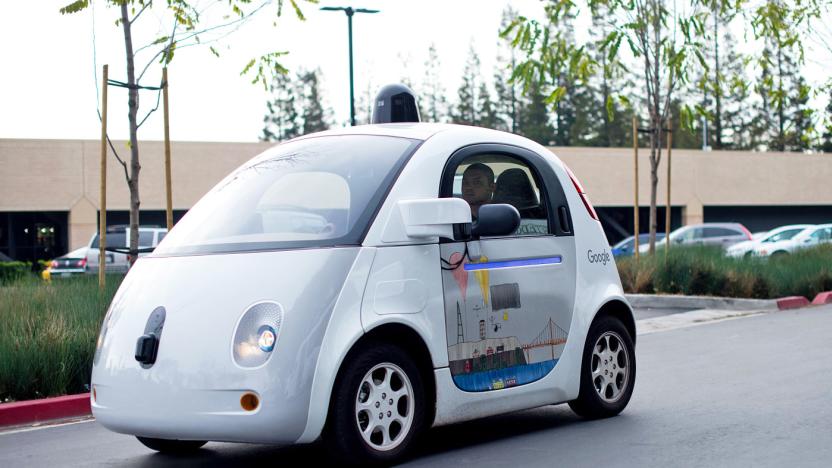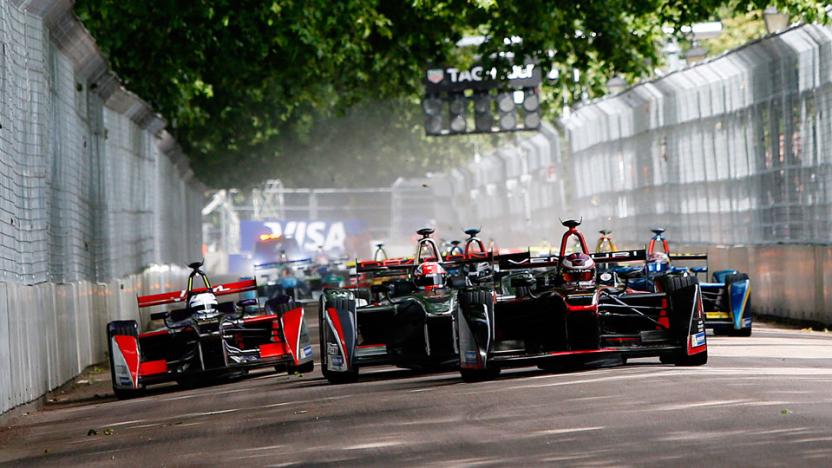driverless
Latest

California approves unmanned self-driving car trials
Given the number of tech companies that call California home, it's no surprise the state has been quick with forward-thinking legislation to support the development of self-driving vehicles. And almost four years to the day since driverless trials on public streets were first approved, a new bill has been signed off by Governor Jerry Brown that permits autonomous car tests without a human passenger overseeing proceedings.

A driverless Rolls-Royce means you can fire your chauffeur
While other electric or autonomous vehicle companies might be content to build a sensible, everyday mode of transport, noted luxury automaker Rolls-Royce is rejecting that notion entirely with its first driverless vehicle concept. In a decidedly lavish announcement, Rolls-Royce says its new Vision Next 100 car has been designed for "the most discerning and powerful patrons in the world."

Put your name down for London's driverless pod trials
Driverless pods are headed to the London borough of Greenwich, and the public is invited to sit inside and experience the technology first hand. The Transport Research Laboratory (TRL) opened sign-ups today for the first public trials, which will take place inside its UK Smart Mobility Living Lab -- a test area that covers the entire borough. The exact routes are still being finalised, but the focus will be around the Greenwich peninsula, in places where the pods are likely to encounter cyclists and pedestrians. We don't know when the trials will start, however, beyond "later this year."

NVIDIA will power the first-ever driverless race cars
NVIDIA made autonomous cars a major company focus a few years ago, but today it announced something a bit more daring at the GPU Technology Conference in San Jose today. CEO Jen-Hsun Huang that NVIDIA technology would power the custom sports cars competing in the upcoming driverless racing series Roborace. Specifically, the company's Drive PX 2 liquid-cooled supercomputer (which was announced at CES) would make up the brains of these futuristic vehicles.

Google is exploring wireless charging for self-driving cars
Self-driving cars are poised to be an incredible tool of the future, but they won't be much use if they can't hold a charge. It looks like Google wants to solve this problem via resonant magnetic induction, a form of wireless charging that could use manhole-style transmitters embedded in pavement to juice up driverless vehicles, IEEE Spectrum reports.

Porsche chief is no fan of self-driving cars
Porsche might be embracing electric cars and hybrids, but it's not about to welcome autonomous driving tech with open arms. Company chief Oliver Blume has utterly rejected the prospect of a self-driving Porsche, arguing that its owners are the sort who want to drive themselves. The executive doesn't pull any punches, either -- he says it's about enticing as using a "Rolex for boiling eggs," and adds that an iPhone (or rather, its technology) belongs "in your pocket, not on the street." Tell us how you really feel, Oliver.

GM and Lyft team up to create self-driving vehicle network
Lyft and General Motors may be runners-up in their respective industries, but a partnership between the two could significantly boost both driverless vehicles and ride-sharing tech. The companies announced a joint venture to develop a network of autonomous cars, a first for a ride-sharing company and automaker. In the short-term, GM will provide vehicle rentals and its OnStar network to Lyft drivers, while Lyft will offer perks to GM drivers, presumably via trips for vehicle owners. In the long term, however, the companies plan to develop "a network of on-demand autonomous vehicles" developed by GM that might one day pick you up from the curb.

Formula E is planning the first racing series for driverless cars
It was only last year that Formula E made its debut as the first racing series exclusively for electric cars. Now, after just two seasons of championships, its organizers are already preparing for another first: a driverless racing series. The series, dubbed Roborace, will begin with the 2016-2017 season, with each one-hour event taking place directly before all the "regular" Formula E races, and on the same circuits, to boot.

See London through the eyes of a self-driving car
When a driverless car glides down the street, avoiding pedestrians and stopping at traffic lights, what exactly does it see? Is the machine's perspective of the world so different to you and me? To give us an inside look, ScanLAB Projects strapped a laser scanner to a Honda CR-V and cruised through the streets of London. Although the car was being driven by a human, the LIDAR (light detection and ranging) equipment performed similarly to how it would in a driverless car. Like radar or sonar, this involves firing a laser in every direction and then measuring the time it takes to reflect back off nearby objects. These timings are then collected, analyzed and collected again to give the car a real-time picture of its surroundings. ScanLAB Projects is a London design company that uses the technology for art and visualisation purposes; they've already scanned museums, an underground railway line and the arctic circle. Its latest video -- produced for the New York Times Magazine -- combines the LIDAR recordings from the drive for a beautiful, eery look at the city.

UK's first driverless 'pod' readies itself for public trials
Britain wants to be at the forefront of driverless car technology, so it's funding a handful of research projects that will look at different vehicle designs and how people react to them. One of those initiatives, led by Transport Systems Catapult and the RDM Group, is inching closer towards public trials today with the unveiling of a new "Lutz Pathfinder" pod. We first saw the vehicle back in February, covered with Union Jack decals, but that was actually just a prototype. The new two-seater pod unveiled this morning is far closer to completion -- it just needs to visit Oxford University's Mobile Robotics Group, where it'll be fitted with an autonomous control system. Researchers will then do a number of calibration tests on a private test track, before it's finally sent out for public testing in Milton Keynes.

Autonomous golf carts drive tourists around in Singapore
MIT and the National Research Foundation of Singapore recently tested an autonomous vehicle they developed together. No, it's not a car or a truck -- it's a golf cart. The researchers created a self-driving golf cart called SMART and deployed several at a public garden to drive 500 or so tourists around during a six-day experiment. Since they crafted a whole system and not just the autonomous vehicle itself, they also tested a booking method which people used to schedule pick-ups and drop offs. In the future, that system could be adapted to a mobile app like Uber.

UK sets the rules of the road for driverless car tests
A bunch of driverless cars are now being trialled in the UK, so it makes sense to give researchers a special kind of road-testing rulebook. After all, Britain's existing laws were never written with autonomous vehicles in mind. To support the new wave of research, the Department for Transport (DfT) has published a Code of Practice which sets out some basic ground rules for testing driverless cars on public roads. These include having a backup driver that can retake control at any moment -- similar to how Google's driverless cars operate in the US. Supervisors should also hold an appropriate UK driving licence and be familiar with new systems that might cause problems and require intervention.

How Google's robotic cars deal with human stupidity
Like the Terminator T-800, Google's self-driving cars don't feel pity, remorse or fear. But they also never lose their patience or get distracted by smartphones, and Google has revealed data collected by its vehicles showing just how bad we human drivers can get. It said the goal with the Medium article was to improve road safety by reminding us that "driver error causes 94 percent of crashes." Program director Chris Urmson said that "our safety drivers routinely see people weaving in and out of their lanes; we've spotted people reading books, and even one playing a trumpet."

Google publishes the boring details of its self-driving car accidents
While Google prepares to move its driverless car tests from modified hatchbacks and SUVs to the custom prototype shown above, questions keep popping up about any accidents they've been in (even though the car itself has not been at fault). Earlier this week Google co-founder Sergey Brin stook questions about those accidents, and today the company issued the first of a series of monthly breakdowns on its autonomous driving tests. USA Today says the reports will include info about any incidents, as well as other anecdotes and examples of how the cars handle every day traffic situations. Of course, if Google wanted to hide any information about its progress then it has found the perfect way -- it turns out that reading about a car getting rear-ended at stop lights incredibly boring, even if it's a self-driving car that was hit.

The autonomous shuttle hoping to transform public transport
A common criticism of self-driving vehicles is that many people, especially petrolheads, love getting behind the wheel and putting the pedal to the floor. It's true that some companies are developing autonomous replacements for the car on your driveway, but others are taking a slightly different approach. While the technology is still in its infancy, they're building driverless vehicles that supplement, rather than replace, traditional motors and public transport, with the idea being that they could ferry urbanites across short distances. An autonomous bus might sound less exciting than the recently rumored self-driving Apple car, but it could prove more useful and achievable, at least in the near future.

The future of driverless cars is being shaped by a modified Land Rover
There's no single blueprint for building a self-driving car. Certain components have become standard fare, such as laser-powered LIDAR sensors, but there's no definitive design just yet. We've seen some polished prototypes already, including the Lutz Pathfinder pod and Google's bubbly little motor, but most companies are still experimenting. As such, it's pointless for them to design and build a beautifully arched hood if, after a few test drives, engineers decide the front-grille camera would be better placed on the roof.

This simulator wants to solve a big problem with self-driving cars: you
Self-driving cars are edging ever closer to becoming smart, reliable motors people can actually buy from their local dealerships. Google's crafted its first cheery prototype and Audi's driverless RS7 will happily whip around a test track at 150MPH. But while autonomous-vehicle technology is maturing, engineers and researchers still have plenty of challenges ahead. Many of them revolve around human interaction -- when driverless cars finally enter the public domain, they're likely to come with standard controls, including pedals and a steering wheel. Despite their ability to cruise around independently, these vehicles will require a manual override just in case the driver needs to retake control. But how exactly will that human-machine changeover play out inside the vehicle?

Meet the Lutz pod, the UK's first driverless 'car'
We're all pretty familiar with Google's self-driving car, right? The smiley-faced automobile has been stealing headlines since its first reveal, but now the UK government wants a turn in the spotlight. A couple of months ago, we heard about a series of driverless car trials it was funding to push Britain's R&D image. That's now been backed up with an official review which concluded that automated vehicles are safe enough to be tested on public roads, provided a safety driver is present and they comply with normal traffic laws.

Singapore tests self-driving cars you use like taxis
One of the greatest allures of self-driving cars is the prospect of never needing your own vehicle -- you could just catch robotic rides whenever you want personal transportation. Well, Singapore is about to explore how well that concept works in practice. The city (with MIT's help) is opening up one of its neighborhoods to autonomous cars next year to see how well they could eliminate traffic congestion. Ideally, you'll use these driverless vehicles like short-range taxis or Uber cars: hail one whenever you need to get to the airport or train station and keep another privately-owned car off the road. That's particularly helpful in Singapore, where the extreme population density (19,725 people per square mile) has led to strong government incentives for using mass transit.

This is what Britain has planned for its driverless car trials
In the not too distant future, we could be clambering into cars that can happily drive themselves to our intended destination. After launching a government-funded competition back in July, the quango Innovate UK (formerly the Technology Strategy Board) has selected four cities to host driverless car trials in Britain next year. The three new projects will cover London, Coventry, Bristol and Milton Keynes, and examine how different self-driving vehicles could be implemented safely and efficiently across the UK.








